
The Bible tells us that the Lord looks at the heart and I’ve heard many interpretations.
Some say He looks at our sin, some say our motives and intentions. Others say He searches for how hard our hearts are.
Through this post, I wanted to share perhaps a different perspective on this verse, at least what I feel God has been saying to me through this scripture and in relation to healing.
Mind-body doctor Gabor Mate stresses how lack of authenticity causes chronic disease later on in life. When the Lord looks at the heart, He sees whether we are living authentically.
Today I look at some areas where we may be unconsciously living a lie, followed by 7 ways to live in our own truth. The place where I believe God wants us to be.
THE LORD LOOKS AT THE HEART
Recently I wrote a post on Walking in truth as in 3 John 1:2, but that referred to walking in The Truth (as in the truth of the Gospel of Jesus Christ).
This is different but with overlaps.
Today’s post is about our internal truth which is unique; I’m talking about true authenticity.
When God knit us in our mother’s womb, He created a child to His specifications. Someone with uniqueness, gifts and talents, personality traits, preferences, and strengths…..
When we’re born, however, we quickly perceive messages from the external world (parents, culture, the environment, church, society…) as to how we’re going to best survive in life.
We adapt ourselves according to our child-ish perceptions which often lack rationale or cognition and therefore, very creatively, we re-invent ourselves to survive what our system thinks is threatening.
Isn’t it fascinating how incredibly wonderful and complex our heavenly Father has created us?
When the Lord looks at the heart, He sees the person He saw when He laid the foundation of the world. He sees us perfect and in Christ.
God also sees all those unique characteristics he placed in us when we were in our mother’s womb.
He sees a strong, beautiful and mighty child of God. However, many of us are living in the distortion. So there is a gap between who God sees and who the world sees.
The world sees the image we unconsciously project; who we think we need to be.
7 WAYS TO LIVE YOUR TRUTH
I personally believe that healing is just as much to do with God healing us back to the person He saw when He lay the foundation of the world, as healing physical symptoms.
When we default to programming, we live in the distortion, the lie, and not in our truth.
One of my cornerstone verses for healing is Jer 30:17
For I will restore health to you And heal you of your wounds,’ says the LORD
Jer 30:17
To me, this verse suggests that God heals us, His children, AND then heals our physical symptoms.
We think God ‘should’ heal the part of us that is bothering us the most according to our own perception.
Man looks at the outward appearance and sees what we want them to see. The image we project to the world, the mask that keeps us safe.
The Lord looks at the heart and sees who we really are and this is who he wants to shine through into the world.
I’ve put together a list of 7 ways I believe God is healing and helping me live in my own truth as I continue through life.
They all pertain to Him healing me back to true authenticity. You may relate to some or all of them.
We really do need Holy Spirit help with this because I think a lot of us live out of our childhood programs more than we realise.
These traits we develop are unconscious. We think they are a part of us, our norm but they may be hindering who God wants us to be in this world and consequently our healing.
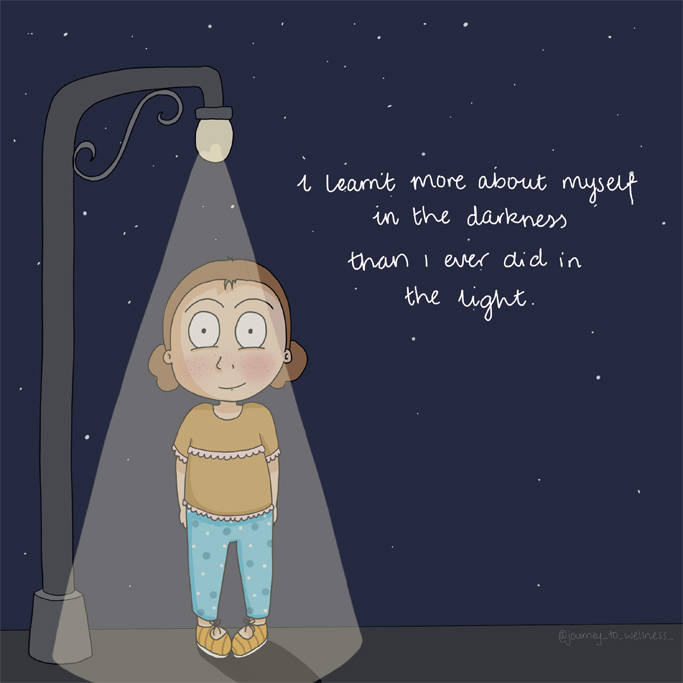
1. NERVOUS SYSTEM REGULATION
When you encounter chronic stress or childhood trauma our nervous system gets ‘thrown off course’.
This is no-one’s fault.
The nervous system responds to stress and trauma automatically. We have little say in how it behaves. The reality is we’re living in a world where bad things happen to us and our system protects us in the only way it knows how.
We can get stuck in survival mode and we learn to live life from this place. You’ve probably heard of fight / flight / freeze.
Well, in a nutshell, some of us, including me, learn to live here permanently. In order to heal our bodies, we need to allow God to heal our nervous system first.
Our system thinks we’re either running away from a tiger, fighting an enemy or hibernating from the world.
We’re not designed to live here so we have to allow God to help us show our nervous system that we are indeed safe.
When we live in this place or survival, part of our true self is offline. The pre-frontal cortex is part of our brain. This is the rational and logical part of us which we need to live in our truth.
Otherwise, we operate from survival. (I will write about this soon)
(see WHAT IS THE AUTONOMIC NERVOUS SYSTEM?)
SOLUTION:
In order to be regulated, we need to develop and establish a relationship with our bodies.
Did you know that having a relationship with our body was a thing?
Some of us are deep thinkers and we over analyse things, but living in our heads 100% of the time is not God’s best.
This is not how God wants us to live.
For starters, we are unlikely to hear God as well because He speaks to our Spirits and not to our academic minds. And also, because our body ‘speaks’ to us as well.
My understanding is that when we endure trauma in childhood, it is so distressing and uncomfortable that we develop a coping mechanism to distract from the pain of dysregulation (see above).
Living in our heads is an excellent coping strategy which helps us to survive but as an adult we now need to learn how to come back to our bodies.
Trauma experts like Bessel Van Der Kolk and Peter Levine say we hold past traumas and old stored stress in our cells which may cause illness later on in life.
I love that Peter Levine has put together a series of exercises in his book, Healing Trauma, to help those who have lived through trauma.
Whilst we’re believing God for healing, putting in place mind-body exercises such as orienting, grounding, body scans, breathing exercises, visualisations and applying regulating resources to our daily routine (which of course includes prayer and Scripture reading)
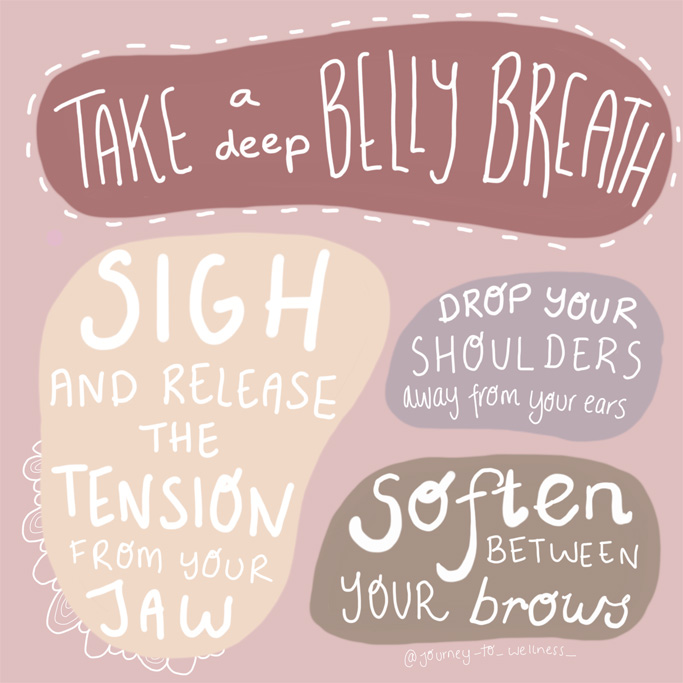
I just want to clarify here, that there are certain mind-body modalities I personally would stay away from such as breathwork or yoga and anything I believe to be ‘new-age’.
(Always check with your health practitioner before doing any mind-body exercises as they may not be appropriate for everyone)
2. BE GOD-PLEASING
We give our power away when we don’t think our thoughts and opinions are valid. People-pleasers usually don’t speak up when they need to or voice their opinion.
They unconsciously take on board others’ opinions without even realising it. God has given each one of us the right and the ability to be authentic.
How many times do we say ‘yes’ when we really mean ‘no’? Or perhaps ignore that ‘gut’ feeling that something isn’t quite right.
Not long ago, I had an appointment with my therapist but the snow was particularly bad. I didn’t want to let her down so I had every intention of making the session.
My therapist cancelled, and later informed me, that out of all her clients, I was the only one who didn’t cancel. I’d put my perception of her needs and expectations, above my own wellbeing.
Or maybe you’re in a relationship and the other person is saying or doing something that is hurting you.
Instead of saying something, you keep quiet as you don’t want to create a conflict. You’re putting someone else’s needs ahead of your own. You live in someone else’s truth.
If this is the case, then boundary setting has gotten lost. I so understand this, it’s a childhood pattern that keeps us safe when we were young.
We give in to pressure from external forces and feel uncomfortable if we let someone down.
Mind-body Dr John Sarno links people pleasing with chronic pain disorders so recognising when we do this and asking God to help us break free from it helps us as we heal.
SOLUTION:
Growing in self-love and breaking free from people-pleasing is a journey. I don’t think it’s about honouring people less, but more about honouring ourselves more.
Pleasing others is not necessarily pleasing God and it’s not how we live our own truth. The Lord looks at the heart, and sees if you are honouring yourself.
Am I now trying to win the approval of human beings, or of God? Or am I trying to please people? If I were still trying to please people, I would not be a servant of Christ.
Gal 1:10
To focus more on our identity in Christ so as to confidently speak up and make our needs known.
We are not allowing the real us, the person God created, to shine through if we are continually denying our own truth.
Learning to recognise those times when we feel unsafe or threatened by a situation or person somehow, then practise breaking free from the pattern even if is uncomfortable.
Take a read of THE HEALING OF BARTIMAEUS: LET GO OF PEOPLE PLEASING
3. DECISIVENESS
There’s nothing worse than not being able to make up your own mind about something. We don’t own our own power when we continually ask others to make up our minds for us.
The ability to make choices and decisions comes from within, not from the external. How can someone else know what is in our own heart?
Let’s say you’re in a job that is making you very unhappy but you’re not sure whether to wait to see if it improves or if you should look for a new job.
So instead you either tread water or ask someone else what to do.
Either way we’re not owning our power. In counselling we call this latter ‘solution’ an external locus of evaluation. We live in someone else’s truth. Why should they know what’s best for us?
I believe this coping strategy begins in childhood when those around us devalue our own truth. We lose that sense of boundary.
When we allow someone else to be in control of our decisions. It’s a bit like a child who needs permission from a parent to do something.
Sometimes when you’ve gone through bad experiences, you can begin to doubt yourself. Maybe you’ve been on the receiving end of a controlling parent or spouse.
There can also be an unconscious fear of responsibility so when someone else makes the decision, we feel safe and free from consequences.
We get comfort from those around us instead of allowing either God or ourselves to self-soothe. Outwardly we’re moving forward, but we’re unconsciously being moulded by external forces.
To live in your own truth is to have confidence in your own decisions and to know your own mind. And to seek Him for guidance because He knows what He’s put in your heart.
Otherwise, we’re giving authority to someone else.
SOLUTION:
As I said a moment ago, I’m learning to tune into my body more, to recognise that ‘inner gut feeling’ of what is right for me, then to follow this through with my decision.
Self-love, self-love, self-love…
If you don’t love yourself, your sense of shame and unworthiness may drive you to elevate everyone else’s thoughts above your own. You lose yourself if you allow the external world to guide you due to a false sense of security.
To continue to remind myself of who I am in Christ and who Christ is in me. See GOD SAYS YOU ARE WORTHY. 7 STEPS TO GROW SELF-WORTH
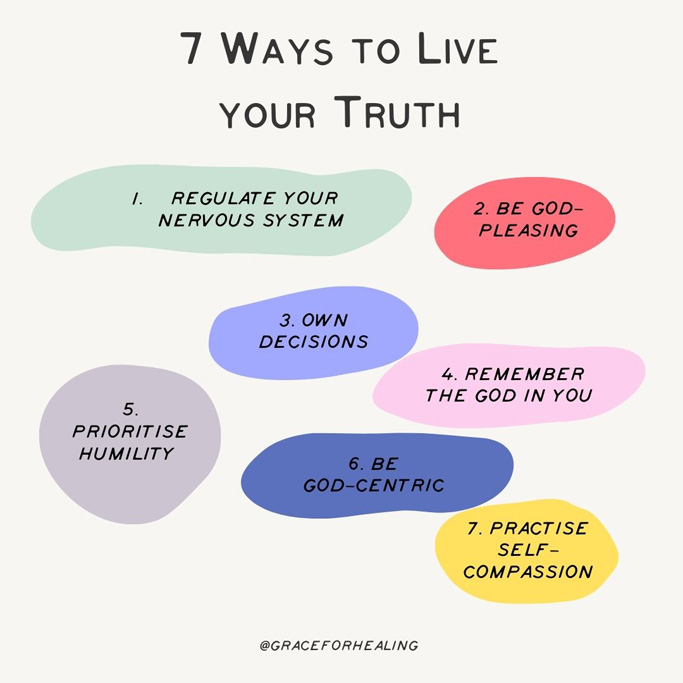
4. REMEMBER THE GOD IN YOU
As Christians we’re not meant to play small. There is hidden treasure in all of us – gifts, talents and abilities that we can use to point people to Jesus.
The enemy wants to keep you small and contained. God wants us to keep on moving forward, growing and improving in all areas. To live in your truth is to be rational rather than allowing fear to run the show.
Because the Lord looks at the heart, He knows what He’s put on the inside.
Have you ever been faced with an opportunity but due to fear or uncertainty you run a mile? I think when you’re chronically ill, it’s easy to want to stay safe.
‘What if…? thoughts can plague us so frequently. Perhaps all your energy is in surviving as well? I so understand this.
Our truth says ‘go for it!’ but fear says ‘don’t do it..it’s not safe!’
Can you relate?
SOLUTION:
but perfect love casts out fear
1 John 4:18
Beginning to welcome that feeling of fear. Not so much the spirit of fear, but the emotion that accompanies it.
In counselling I talk to my clients about how there are no negative emotions, that they are safe and won’t kill us.
When we think our emotions are dangerous, we repress them and develop strategies which keep us in the pain-fear cycle.
Challenging toxic thoughts and taking them captive also helps with us overcoming the fear of fear.
For some, this is a really long process. 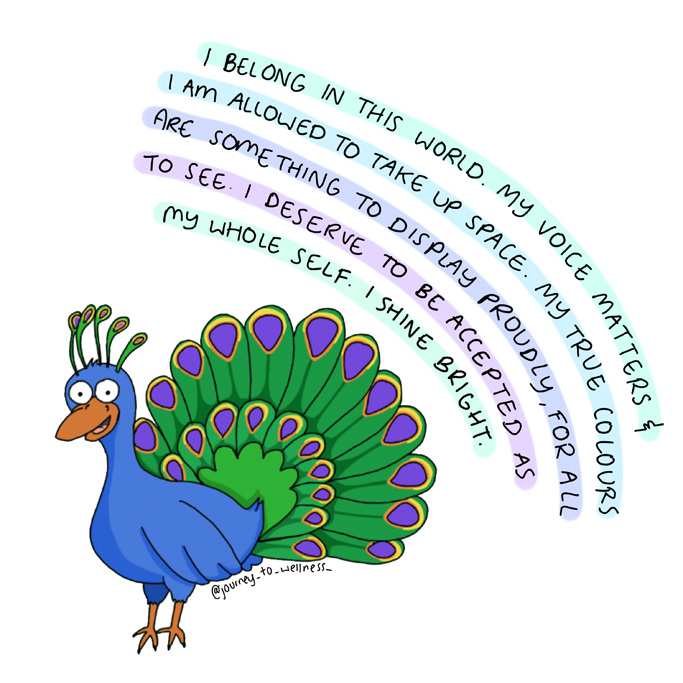
5. HUMILITY
When you’re chronically ill, it’s understandable that you feel heartbroken. You grieve the things you’re missing out on and you keep telling God just how unfair it is.
This is so understandable.
But it is so important that we allow God to lead us in being the head and not the tail of our situations. To not feel the need to announce our misfortunes to those who’ll listen or to ruminate on how miserable life is.
It is human nature to focus on all the things that aren’t right. This can be our programming so we think it’s normal and comfortable.
We’re conformed to think that we are victims of our circumstances. Healing starts on the inside and stepping out of the victim empowers us to take back control.
Your true self is one of the victor. God has placed this on the inside and when we look at our own hearts, we too will see all that God has given us.
SOLUTION:
To continue to grow in our identity in Christ. Despite what is going on in our lives, “And God raised us up with Christ and seated us with him in the heavenly realms in Christ Jesus” Eph 2:6
For some, the key is to recognise when pity starts running the show, so we can quickly ‘take the path less travelled’ Alan Gordon. Take a read of HEALING AT THE POOL OF BETHESDA: WHY SOME DON’T HEAL
6. GOD-CENTRIC
We live in the instagram world where the image we present to the world matters. We want others to like us, to be popular
If the person we present to the world is different from our true authentic self then we’ve allowed other people to rob us from who God has called us to be.
If this is the case, then this is where we’re getting our self-esteem from, our sense of self-worth.
We change ourselves in order to be accepted by society and find ourselves caring way too much about what others think.
I see this massively in the church. We’re listening to the programming and not our authentic self.
For example, Unconsciously, we think productivity, busyness, being the leader or being noticed by the ‘right’ people is the answer.
This is ego.
We wear these as masks, just as Naaman wore all his accolades the way a peacock wears her feathers.
(For more on pride/ego, read LESSONS FROM THE STORY OF NAAMAN. CHECK YOUR EGO
When you live in your truth you won’t glorify the doing and how others see you.
Or maybe you want the world to think you’re strong so you disown true feelings and repress those emotions? Somewhere along the lines, you’ve believed the emotion is ’weak’.
Naaman, King Saul and the Pharisees were image-centric.
God has given you authority but you give it away when you conform to the external. The Lord looks at the heart, and so must we.
SOLUTION:
Where is the ego dominating your life? This takes self-awareness to recognise those areas where you are conformed by the world (and dare I say the church?)
One of my Church pastors said a truth I will never forget: ‘Everything you do, do it for the audience of one’
Always check that motives are in alignment with your own values and God’s. Holy Spirit guidance is key if you want to live your own truth and not someone else’s.
7. SELF-COMPASSION
I call my innner critic, my own personal pharisee and I think it goes hand in hand with perfectionism. The need to get things right, both morally and practically.
We can be our own worst critic over anything that falls short of perfection, the unrealistic expectation we have of ourselves.
The part of us that compares ourselves to others but only when our ‘performance’ is lesser in our own eyes.
Self-condemnation secretly drags us down. We see all our flaws and weaknesses or the parts of us that don’t tick the right boxes.
Perfectionism is also a personality trait linked to chronic illness. We fear criticism and judgement so striving for perfection keeps us ‘safe’.
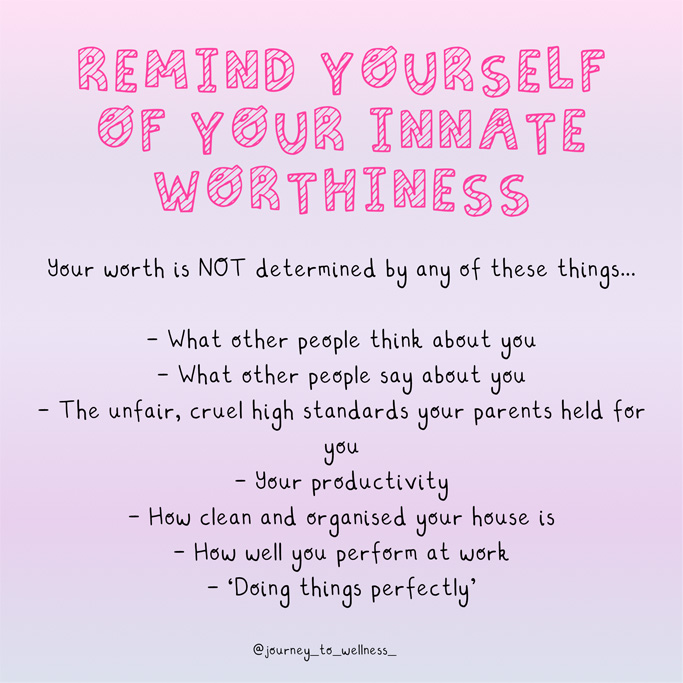
SOLUTION:
Therefore, as God’s chosen people, holy and dearly loved, clothe yourselves with compassion, kindness, humility, gentleness and patience.
Col 3:12
Can we apply this verse to ourselves? I’m talking about self-compassion, kindness and gentleness towards oneself.
If the Lord looks at the heart and says ‘You are a masterpiece’ then so must we.
He likes what He sees.
An activity I encourage my clients is, in ‘what would you say to a friend?’ Or ‘what would someone who loves themselves do or say?’
I always tend to think that awareness precedes any change so asking the Holy Spirit to show us where we don’t live in our own truth would be the starting point.
For any of these patterns of thinking and behaviour, shame may be at the root (but I’ve written about this several times before so I won’t go into it here.)
Once you recognise the programming that has been steering the ship all your life, you can now choose to step out of the script.
Alan Gordon calls this ‘travelling the path less travelled’.
Andrew Wommack in one of his teachings says we don’t need more faith, but we do need a greater revelation of the love of God.
The more we receive His love, the less likely we are to conform to the world around us. We will like what God has put in our own hearts and live from that place.
We are more likely to step out in faith when fear no longer controls us and our own self-love starts to replace the inner critic.
It’s quite a journey, and it will continue our whole life.
In my opinion, healing is not just about being free from symptoms, but allowing God to heal parts of me that I didn’t realise were stealing my authentic voice.
Did you relate to any of the above patterns? We cannot separate the emotional inner world from the environment and our physical health.
I hope this post helps you today.
Take care, Lorna
For more like this, check out
